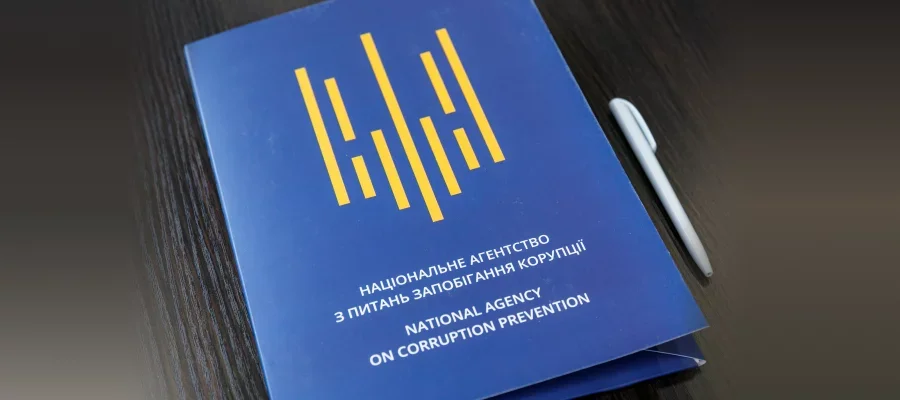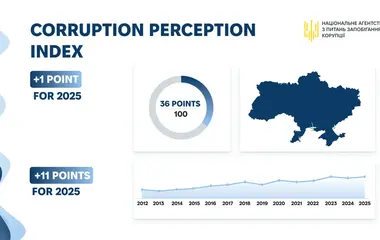A conflict of interest arises when personal circumstances influence the objectivity and impartiality in decision-making. Such circumstances often lead officials to commit corrupt or corruption-related violations. In November, the National Agency on Corruption Prevention (NACP) compiled a series of protocols for administrative violations, and issued several directives for violations of legislation regarding ethical conduct, prevention, and regulation of conflicts of interest.
Last month, the NACP drafted a protocol for committing an administrative violation related to corruption under Article 172-7 of the Code of Administrative Offenses (the CAO), regarding Ukrainian Member of Parliament Oleksandr Dubinskyi. The NACP found that Dubinskyi submitted parliamentary appeals to the Ministry of Health and the National Anti-Corruption Bureau (NABU) for the satisfaction of a private interest—obtaining information necessary for his own defense against criminal prosecution.
A similar protocol has been drafted regarding the former Deputy Head of the Asset Recovery and Management Agency (ARMA), Philip Pronin. While under the authority of the former ARMA Head, Dmytro Zhoravovych, Pronin approved the establishment of additional incentive payments in the midst of a real conflict of interest. Specifically, on the second day of the full-scale invasion, Pronin approved granting Zhoravovych a 330% workload intensity allowance until the end of 2022 and a 150% bonus for performing particularly important work until April 2022.
The NAPC has submitted the protocol for consideration on the merits to the Shevchenkivskyi District Court of Kyiv regarding the former Head of the National Commission on State Language Standards, Orysia Demska. During monitoring and control of compliance with legislation on conflict of interest prevention and regulation, it was found that she, contrary to the requirements of the Law of Ukraine 'On Prevention of Corruption,' signed an order in November and December 2021 to establish additional workload intensity allowances for herself.
The NACP has also compiled protocols for administrative violation regarding the acting Chair of the Constitutional Court of Ukraine (CCU), Serhiy Holovatyi, and the head of the CCU Secretariat, Viktor Beschastnyi. They refused to provide the information requested by the NACP, indicating signs of an administrative violation under Article 188-46 of the CAO.
The NACP has approved and forwarded to the National Police of Ukraine a substantiated conclusion on the identification of signs of a corruption-related offense concerning an advisor to the Derhachiv city mayor. It was found that, while in office, he received a gift in the form of a share in the statutory capital of a company, the value of which exceeds one subsistence minimum. This action violated the restrictions set by Article 23, Part 2, of the Law.
The NACP has also submitted a substantiated conclusion to the National Police on the identification of administrative violations in the activities of a military official of the Armed Forces of Ukraine, as provided by Part 1 and Part 2 of Article 172-7 of the CAO. As a member of the commission of a military unit for reviewing materials on recognizing participants in hostilities, he made a positive decision regarding his nephew during a commission meeting
In compliance with the directive from the NACP, the Mayor of Brody issued an order to dismiss his first deputy. Previously, the NACP issued a directive to the city mayor, demanding compliance with the requirements of Article 27 of the Law by eliminating the direct subordinate relationship between him and his first deputy, who is a close person according to the law's requirements. The mayor appointed him to the position after his election in 2020.
As a result of the review of the NACP`s directive, four of its officials from the state enterprise 'Forests of Ukraine' have been held accountable for disciplinary action. Prior to this, the NACP found that they used the enterprise's vehicle for private purposes.
Learn more about conflicts of interest and how to regulate them in the NACP Knowledge Base.
The goal of the NACP's work is to reduce the number of corruption-related offenses. Therefore, the NACP aims to increase awareness among officials and all citizens on issues of preventing and regulating conflicts of interest.
To enhance expertise in matters of integrity, we have developed tests that, upon completion, will make you more experienced:
- - Conflict of Interest Presence Test: This test helps public servants with doubts quickly navigate through various typical problematic situations to determine the presence or absence of a conflict of interest.
- - Conflict of Interest Regulation Test: This test guides individuals on who to report to and what measures to take to regulate a conflict of interest if one arises.
- - Leadership Test for Regulating Conflict of Interest in Subordinates: This test assists leaders in identifying optimal actions for resolving conflicts of interest in their subordinates.









